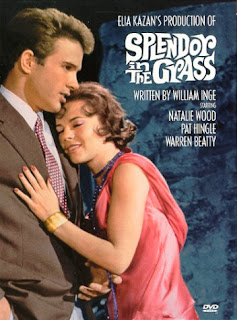Splendor in the Grass (Elia Kazan, 1961): USA
Reviewed by Byron Potau. Viewed on DVD.

In 1961 Natalie Wood twice played a teenager in love, but only in Elia Kazan’s Splendor in the Grass did she get it right. Based on a screenplay by famed playwright William Inge, the film is much more than a powerful love story. It deals with several sensitive subjects including loss of innocence, virginity, sexual repression and frustration, and how parents listen to their children, the advice they give, and the pressures they put on them.
Set in Kansas in the 1920’s, Bud Stamper (Warren Beatty) and Deanie Loomis (Natalie Wood) are two teenagers in love who regularly spend the night making out and little else before Bud takes Deanie home. Bud’s hormones are raging out of control as his sexual frustration builds. Deanie looks to her mom for advice for her own sexual feelings, but her mom tells her that boys don’t respect a woman they can go all the way with, that nice girls don’t have those feelings, and sex is something a woman does not enjoy, but does so in order to have children. This only leaves Deanie even more conflicted and confused.
Bud seeks advice from his father whose main fear is that Bud will get Deanie pregnant and have to marry her, in effect ruining his future. He advises Bud that there is another type of girl for such desires. Bud’s sister Ginny, a flapper who has had an abortion, annulment, and been kicked out of every college she’s attended, has been a great disappointment to Bud’s father, giving Bud the added pressure that his father is pinning all of his hopes on him to go to Yale and take a place in his father’s oil business. All of Bud’s attempts to inform his father that he wants to marry Deanie and become a rancher fall on deaf ears and he is eventually talked out of it.
Frustration and tension ensue, and, eventually, tragedy strikes as the young couple battle their desires against their parents and society’s rules and expectations.
Filmed in 1961 and set in the 1920’s, the film is still amazingly relevant today as all of the problems addressed in the film still exist today. Teenagers have to contend with communication problems with their parents, their parent’s expectations of them, society’s restrictions and expectations of their sexuality, nice girls vs. bad girls, fears of teen pregnancy, date rape, sexual desires and frustrations, and when to lose their virginity. I don’t jest when I suggest that the film should be required 9th grade viewing in schools.
Inge’s mature screenplay never becomes preachy or heavy handed, deservedly winning the Academy Award, and Kazan’s handling of actors hits all the right notes with their characters and the situations they are in. Appreciation for Kazan’s direction is even more deserved because of the difficult scenes and subject matter, ranking with the best of the director’s work.
There are few scenes I find more powerful and emotionally charged than Wood’s thrashing around in the bathtub as she tells her mother, yelling in erratic voice, that she is not spoiled, meaning she has not had sex yet. Wood’s performance was by far the best of her career bringing tenderness and sensitivity to Deanie, but also a sexiness and an unnerving instability. It is a truly heartbreaking performance.
As Bud, Warren Beatty is solid in his film debut, showing he has more to offer than just good looks. Some of the emotionally difficult scenes prove challenging for Beatty and his performance could be nitpicked, but he is really quite good overall, meeting most of these challenges and giving a very sensitive lead performance. Pat Hingle’s forceful, energetic turn as Bud’s prideful, overbearing, almost tyrannical at times, father, Ace Stamper, is the film’s other great performance.
The word tearjerker does not begin to describe the emotional impact the film has. It is incredibly sad, harshly real, and truly exceptional. Like William Wordsworth’s poem, “Ode on Intimations of Immortality,” from which the film’s title is taken, the film has a mournful melancholy that cuts deeply and is not easy to forget.
1 Comment
Jump to comment form | comments rss [?] | trackback uri [?]